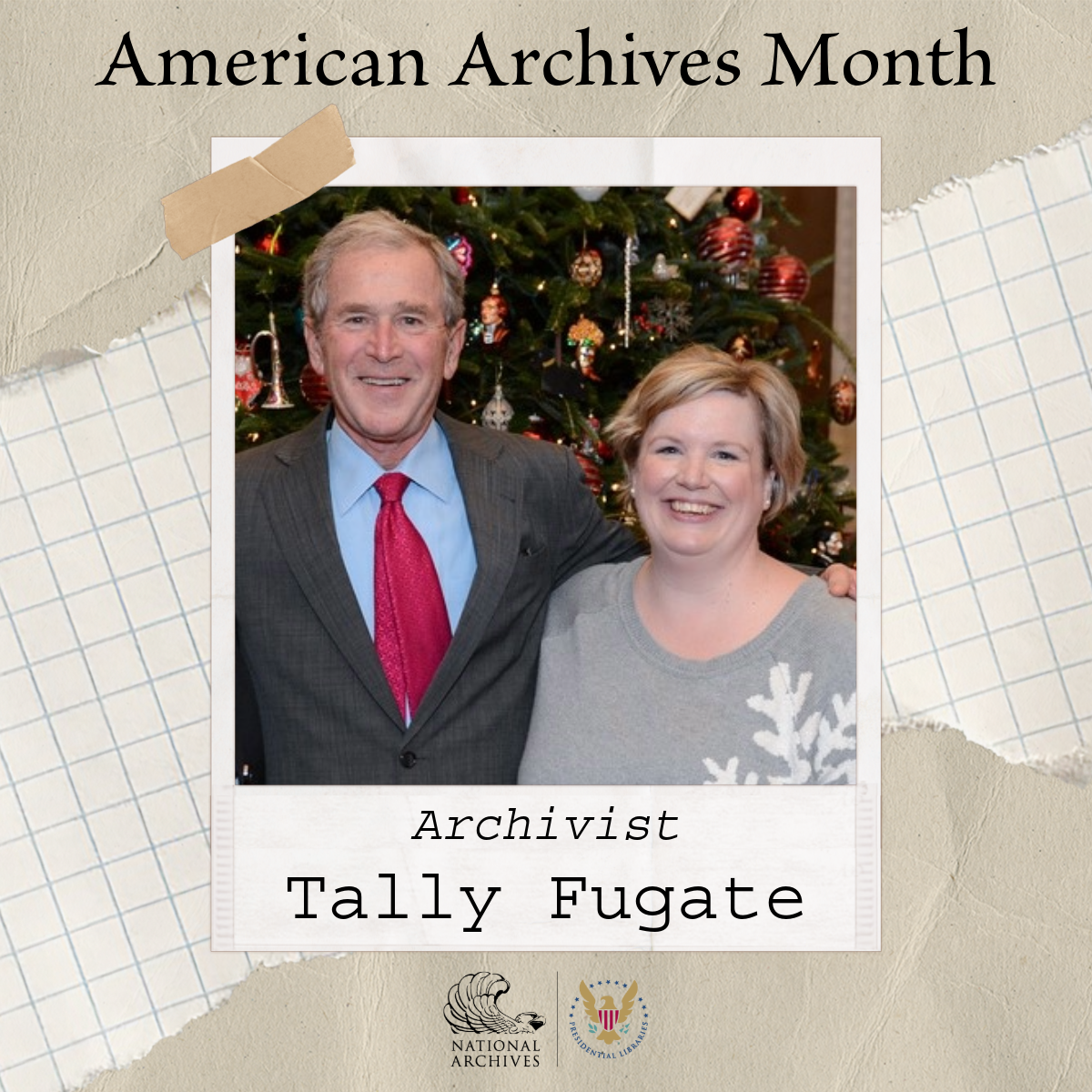
American Archives Month Employee Spotlights - Tally Fugate

Name: Tally Fugate
Job Title: Archivist at the George W. Bush Presidential Library
How long have you worked at the National Archives?
16 years.
What made you interested in being an archivist? Why did you want to work at your Presidential Library in particular?
As a trained historian, it was my love of history and historical research that led me to become involved in archives. I hoped to work in a Presidential Library for the hands-on experience of working with White House documents and providing the public with access to American history as it happened. And, of course, when you find a gold nugget, I enjoy sharing it with my colleagues.
Give us an overview of your job. What are some of your responsibilities?
In a nutshell, my current duties include Freedom of Information Act (FOIA) processing, such as arrangement, description, preservation, and review of documents from various White House collections and series. In so doing, I apply the FOIA exemptions on relevant documents in preparation for notification and opening. I also assist with special access requests, the research room, training new archivists, and the library's website.
What’s the strangest thing that’s happened to you in this line of work? What’s the best?
One of my favorite accomplishments at the library is having had the privilege of being the lead archivist for Mrs. Laura Bush’s book, Spoken from the Heart. I thoroughly enjoyed digging into the White House boxes from the former First Lady’s office to locate requested documents, such as menus, programs, daily schedules, trip books, and initiative related items. It was an opportunity to grasp a better inventory of this collection in the library’s early stages. Yet, it was also an opportunity to better understand and appreciate the political, social, and global importance and influence of the nation’s First Lady, a role that comes with many responsibilities for which no paycheck is received. Each document I located opened my eyes whether it was regarding a long day of detailed planning for a state dinner or a discussion about the treatment of women in Afghanistan.
What’s your favorite fact about the President for your particular library?
One of my favorite facts about the President is that he is actually quite funny. He puts those around him at ease with his humor, orneriness, and down-to-earth Texan personality.
You’re having dinner with the President of your library. What restaurant would you take him to or what would you cook? What artifact would you ask him about? Why?
I would take the President to Cattlemen's Steakhouse in the stockyards of Oklahoma City. The atmosphere is very western and the steaks are superb! And if it was good enough for Bush 41 to stop in for a meal in the 1990s, then it will be good enough today for Bush 43 too!
What's your favorite document, and why?
I have many favorite documents, but one that stands out is a document I found in a Federal Records Center box by accident. It was in a random White House Office of Records Management box with a mix of document types on a variety of topics from a variety of staff. Buried inside, I found a purposefully written note from a White House notepad. Written in the President's own hand and dated May 30, 2002, the document marked the "Somber Day" when the last piece of debris was removed from Ground Zero. I felt overwhelmed with emotions recalling the terrorist attacks on 9/11. I had goosebumps on my arms for some time while holding this Presidential document. I remember I shed a few tears too. The President of our great nation had documented the magnitude of the "Somber Day."
Lastly (and most important), why should people visit or learn more about your Presidential Library?
I recommend that people visit and learn more about all of the Presidential Libraries. They are critically important to learning about the American Presidency and American history and government. Not only to respect and learn from the past, but to become a more informed humanity and citizenry bringing that knowledge forward and applying it to a variety of present and future situations.